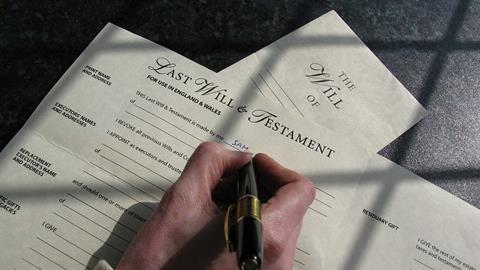Common queries answered about how best to execute wills during the Covid-19 outbreak
I have written a will for a client who is now in self-isolation. How do I arrange the will to be signed and yet keep everyone involved safe?
The situation we find ourselves in does not lend itself to ideal solutions. In practice, this may mean sending wills to clients and asking them to make arrangements for suitable witnesses to visit them while maintaining social distancing.
Under the Wills Act 1837, it is not permitted to witness a will via video conferencing facilities as both witnesses must be physically present. However, they may socially distance themselves from one another during the process so long as they are all present and have clear sight of the process.
You should keep good file notes on how instructions came in and how the will was signed, and where possible ask the client to video record the signing of the will. You may also want to think about discussing resigning the will with the client once social distancing requirements are lifted, where this is appropriate.
Where a client is severely ill in hospital on an isolation ward it is unlikely that any witnesses would be found or even that the will itself would be allowed into the isolation ward.
The Law Society is in daily contact with the Ministry of Justice about legislative concerns regarding executing wills, including requirements for witnessing wills, and the use of video conferencing facilities.
I have been asked to take will instructions for an elderly client who is in self-isolation and, due to a stroke, has difficulty communicating. Can I take instruction over the phone with the assistance of their carer?
To help avoid any later suggestion of undue influence, it is better to take instructions without potential beneficiaries and others who may exert undue influence. Where this is unavoidable, solicitors should record the advice given and the responses and preserve as part of the will file.
Solicitors should be alert to the possibility of undue influence and the added difficulty of assessing mental capacity when another person provides information. It is for the solicitor to decide whether it is in the best interests of the client to ignore certain obligations in order to produce a will for the client. A file note should be made recording the decision and the facts. If in any doubt, make the will for the client.
When the current crisis has passed, the solicitor should arrange to see the client again to confirm the instructions, arrange a capacity assessment if needed, and resign the will.
The Law Society has had conversations with the Solicitors Regulation Authority about regulatory concerns regarding the taking of instructions for wills. The SRA have suggested that solicitors need to act in their client’s best interest during this time and solicitors are advised to maintain good file notes in the will file.
Read the Law Society’s practice note on meeting vulnerable clients’ needs here.
Many firms have always taken will instructions face-to-face from clients in our office. Due to the lockdown they have had to adapt their business model to take instructions over the telephone and via the post. What extra information do they need to give to the client?
Many firms are adapting their business models in light of these unprecedented events. The demand for making and reviewing wills has increased significantly. Firms have to remember if taking instructions anywhere other than office that they have to comply with the requirements of the Consumer Contracts (Information, Cancellation and Additional Charges) Regulations 2013.
Under those regulations, firms must make sure that the client has signed an authority to begin work straight away. When writing a will, the risk of money laundering is low. However, firms may still wish to use an electronic means of identifying the clients where they cannot physically see and take copies of the client’s ID for themselves.
I am instructed on a new estate administration and need to notify various high street banks of the death, I usually do this by letter sending a death certificate. Are the banks picking up post or can this be done by other means?
Practitioners can notify the banks online – a much quicker and simpler process for all involved. Practitioners should sign-up to the free Death Notification Service which allows them to notify several banks and building societies - including Barclays, Lloyds, Halifax, HSBC, Nat West and Nationwide - simultaneously.

Ian Bond, chair of the Law Society’s wills and equity committee
*The Law Society is keeping the coronavirus situation under review and monitoring the advice it receives from the Foreign & Commonwealth Office and Public Health England.
































1 Reader's comment